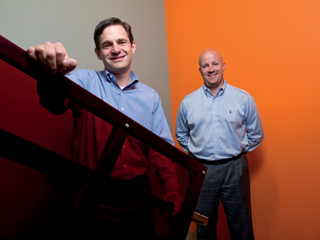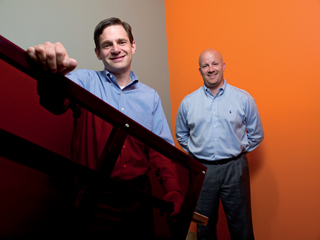

Tech startup: Dizzion Inc.
Eric Peterson //July 1, 2012//

INITIAL LIGHT BULB Steve Prather, Manny Ladis and Rob Green worked together at Greenwood Village-based colocation and data center provider ViaWest for most of the company’s existence, leaving after it sold to a private-equity firm in 2010.
Their post-ViaWest entrepreneurial ideas “kept coming back to virtual desktop architecture,” says Prather, Dizzion’s president and CEO, evolving into the concept of “cloud-delivered desktops.”
The idea has gained immediate traction: Dizzion has about 40 customers and active conversations with another 50 potential clients. “We thought we were six or nine months early,” says Prather. “It turns out the market is a couple of quarters ahead of what we thought it was.”
IN A NUTSHELL “Everyone wants to bring their own device,” says Ladis, senior vice president of sales and marketing. “Employees want to work on their own device. IT wants to maintain control.”
Dizzion offers the best of both worlds with its cloud-delivered desktops. The company streams computer desktops – featuring everything from the operating system to applications to the folder and storage structure – to users on their desktop, laptop, iPad or other device. The VMware-based technology is PCI and HIPAA compliant and integrates with other clouded options.
“We’re disconnecting the user from the confines of their device,” Prather says. “Whatever the device, they have an identical experience on our platform.”
Dizzion’s technology allows for “personalization and persistence,” he adds. “We’ve built the platform so you get the picture of your kid on your desktop. You also get persistence: When you reconnect with another device, you’re at the same point you left off.”
This allows for much easier updating, upgrading and patching for both IT and end user. “That upgrade that used to be painful is now seamless,” Prather says. Pricing ranges from about $40 to $70 per user per month, and applications and other features can be changed on a month-to-month basis, something Ladis terms “rightsizing your licensing.”
“In our model I can sell you Microsoft Excel every month, and you can still get a month of power point if it’s necessary,” Prather explains, noting that the administrator can customize apps and permissions on a desktop-by-desktop basis.
Dizzion’s cloud-delivered desktop “is not only cost-effective, but it removes a lot of headaches as well,” says Matt Showalter, chief information officer at Greenwood Village-based Swiftpage, an email marketing solutions provider. After beta-testing virtualized desktops since early 2012, the company is implementing them in quality assurance in India as well as for salespeople and other remote workers.
“We’re very hesitant to outsource,” Showalter adds. “They’re one of the few where their performance is better than what we could do in-house.”
THE MARKET Customers, many of them local, include Delta Dental, Quark, ServiceMagic and Red Robin. Companies can use it for the enterprise, especially to facilitate work-at-home situations, and software developers can use it for what Prather dubs “SaaS-ification” so they can stream legacy products as SaaS (software as a service). “It’s a unique way to re-monetize legacy software,” he says.
FINANCING The founders self-funded the startup and finalized a family-and-friends round in the spring. They hope to close on a Series A round in late 2012 or early 2013.
where Denver | FOUNDED 2011 | web www.dizzion.com






















